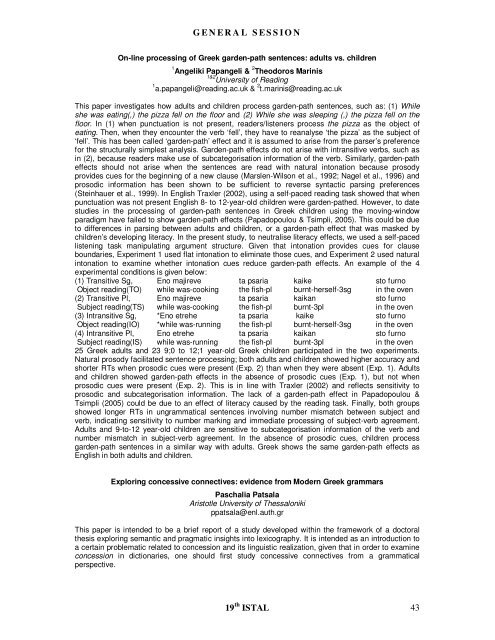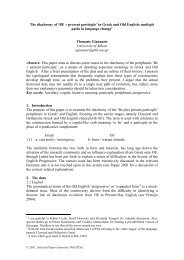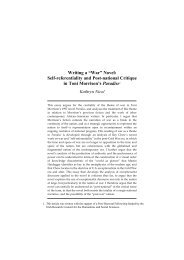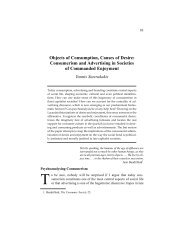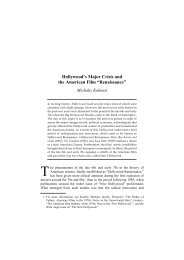19 International Symposium on Theoretical and Applied Linguistics ...
19 International Symposium on Theoretical and Applied Linguistics ...
19 International Symposium on Theoretical and Applied Linguistics ...
Create successful ePaper yourself
Turn your PDF publications into a flip-book with our unique Google optimized e-Paper software.
G E N E R A L S E S S I O N<br />
On-line processing of Greek garden-path sentences: adults vs. children<br />
1 Angeliki Papangeli & 2 Theodoros Marinis<br />
1&2 University of Reading<br />
1 a.papangeli@reading.ac.uk & 2 t.marinis@reading.ac.uk<br />
This paper investigates how adults <strong>and</strong> children process garden-path sentences, such as: (1) While<br />
she was eating(,) the pizza fell <strong>on</strong> the floor <strong>and</strong> (2) While she was sleeping (,) the pizza fell <strong>on</strong> the<br />
floor. In (1) when punctuati<strong>on</strong> is not present, readers/listeners process the pizza as the object of<br />
eating. Then, when they encounter the verb ‘fell’, they have to reanalyse ‘the pizza’ as the subject of<br />
‘fell’. This has been called ‘garden-path’ effect <strong>and</strong> it is assumed to arise from the parser’s preference<br />
for the structurally simplest analysis. Garden-path effects do not arise with intransitive verbs, such as<br />
in (2), because readers make use of subcategorisati<strong>on</strong> informati<strong>on</strong> of the verb. Similarly, garden-path<br />
effects should not arise when the sentences are read with natural int<strong>on</strong>ati<strong>on</strong> because prosody<br />
provides cues for the beginning of a new clause (Marslen-Wils<strong>on</strong> et al., <str<strong>on</strong>g>19</str<strong>on</strong>g>92; Nagel et al., <str<strong>on</strong>g>19</str<strong>on</strong>g>96) <strong>and</strong><br />
prosodic informati<strong>on</strong> has been shown to be sufficient to reverse syntactic parsing preferences<br />
(Steinhauer et al., <str<strong>on</strong>g>19</str<strong>on</strong>g>99). In English Traxler (2002), using a self-paced reading task showed that when<br />
punctuati<strong>on</strong> was not present English 8- to 12-year-old children were garden-pathed. However, to date<br />
studies in the processing of garden-path sentences in Greek children using the moving-window<br />
paradigm have failed to show garden-path effects (Papadopoulou & Tsimpli, 2005). This could be due<br />
to differences in parsing between adults <strong>and</strong> children, or a garden-path effect that was masked by<br />
children’s developing literacy. In the present study, to neutralise literacy effects, we used a self-paced<br />
listening task manipulating argument structure. Given that int<strong>on</strong>ati<strong>on</strong> provides cues for clause<br />
boundaries, Experiment 1 used flat int<strong>on</strong>ati<strong>on</strong> to eliminate those cues, <strong>and</strong> Experiment 2 used natural<br />
int<strong>on</strong>ati<strong>on</strong> to examine whether int<strong>on</strong>ati<strong>on</strong> cues reduce garden-path effects. An example of the 4<br />
experimental c<strong>on</strong>diti<strong>on</strong>s is given below:<br />
(1) Transitive Sg, Eno majireve ta psaria kaike sto furno<br />
Object reading(TO) while was-cooking the fish-pl burnt-herself-3sg in the oven<br />
(2) Transitive Pl, Eno majireve ta psaria kaikan sto furno<br />
Subject reading(TS) while was-cooking the fish-pl burnt-3pl in the oven<br />
(3) Intransitive Sg, *Eno etrehe ta psaria kaike sto furno<br />
Object reading(IO) *while was-running the fish-pl burnt-herself-3sg in the oven<br />
(4) Intransitive Pl, Eno etrehe ta psaria kaikan sto furno<br />
Subject reading(IS) while was-running the fish-pl burnt-3pl in the oven<br />
25 Greek adults <strong>and</strong> 23 9;0 to 12;1 year-old Greek children participated in the two experiments.<br />
Natural prosody facilitated sentence processing; both adults <strong>and</strong> children showed higher accuracy <strong>and</strong><br />
shorter RTs when prosodic cues were present (Exp. 2) than when they were absent (Exp. 1). Adults<br />
<strong>and</strong> children showed garden-path effects in the absence of prosodic cues (Exp. 1), but not when<br />
prosodic cues were present (Exp. 2). This is in line with Traxler (2002) <strong>and</strong> reflects sensitivity to<br />
prosodic <strong>and</strong> subcategorisati<strong>on</strong> informati<strong>on</strong>. The lack of a garden-path effect in Papadopoulou &<br />
Tsimpli (2005) could be due to an effect of literacy caused by the reading task. Finally, both groups<br />
showed l<strong>on</strong>ger RTs in ungrammatical sentences involving number mismatch between subject <strong>and</strong><br />
verb, indicating sensitivity to number marking <strong>and</strong> immediate processing of subject-verb agreement.<br />
Adults <strong>and</strong> 9-to-12 year-old children are sensitive to subcategorisati<strong>on</strong> informati<strong>on</strong> of the verb <strong>and</strong><br />
number mismatch in subject-verb agreement. In the absence of prosodic cues, children process<br />
garden-path sentences in a similar way with adults. Greek shows the same garden-path effects as<br />
English in both adults <strong>and</strong> children.<br />
Exploring c<strong>on</strong>cessive c<strong>on</strong>nectives: evidence from Modern Greek grammars<br />
Paschalia Patsala<br />
Aristotle University of Thessal<strong>on</strong>iki<br />
ppatsala@enl.auth.gr<br />
This paper is intended to be a brief report of a study developed within the framework of a doctoral<br />
thesis exploring semantic <strong>and</strong> pragmatic insights into lexicography. It is intended as an introducti<strong>on</strong> to<br />
a certain problematic related to c<strong>on</strong>cessi<strong>on</strong> <strong>and</strong> its linguistic realizati<strong>on</strong>, given that in order to examine<br />
c<strong>on</strong>cessi<strong>on</strong> in dicti<strong>on</strong>aries, <strong>on</strong>e should first study c<strong>on</strong>cessive c<strong>on</strong>nectives from a grammatical<br />
perspective.<br />
<str<strong>on</strong>g>19</str<strong>on</strong>g> th ISTAL 43


